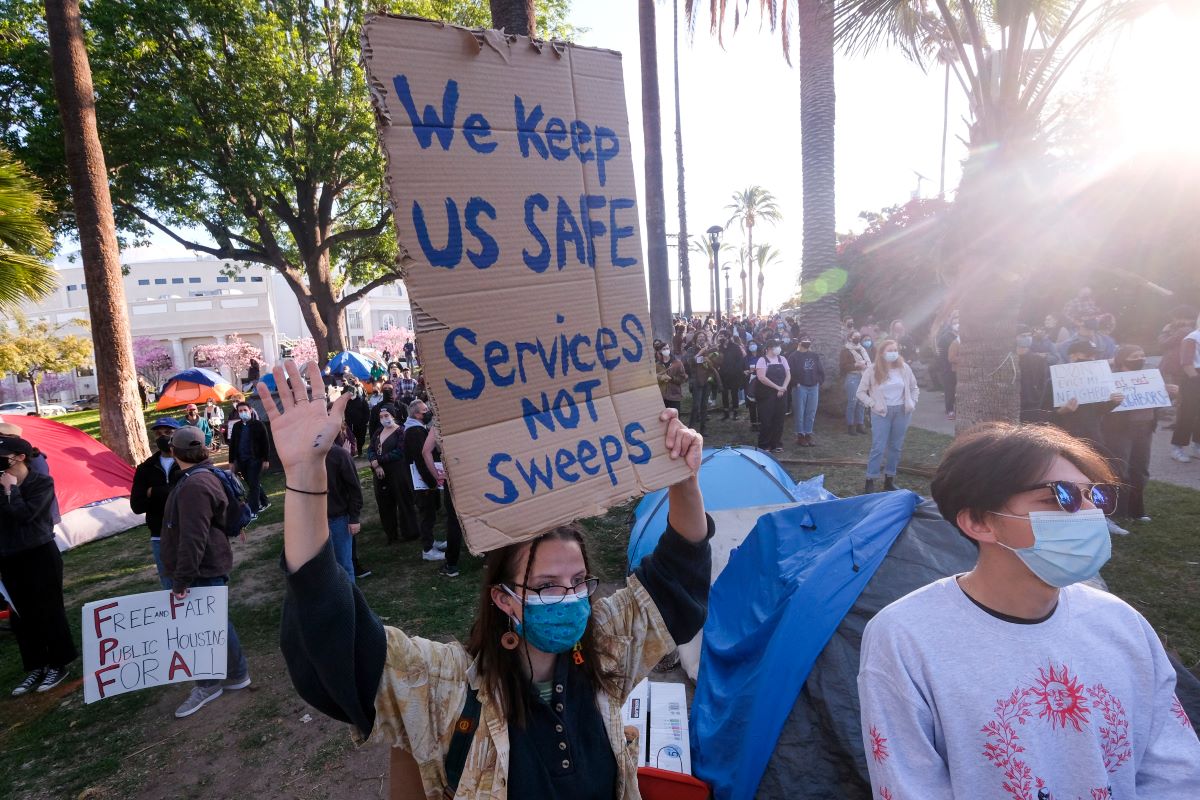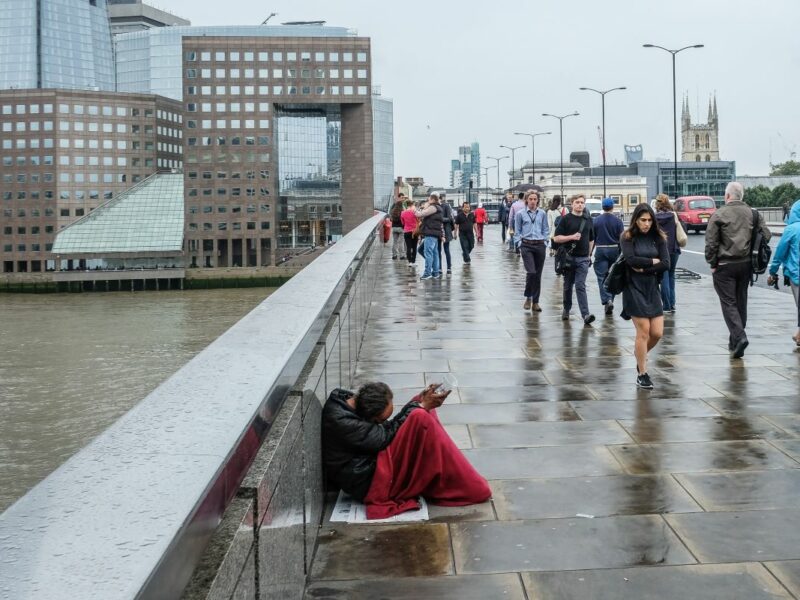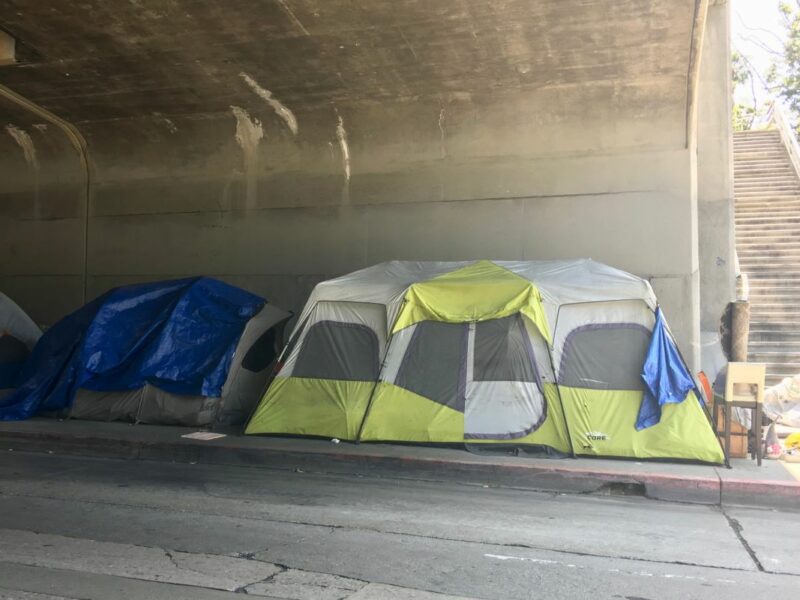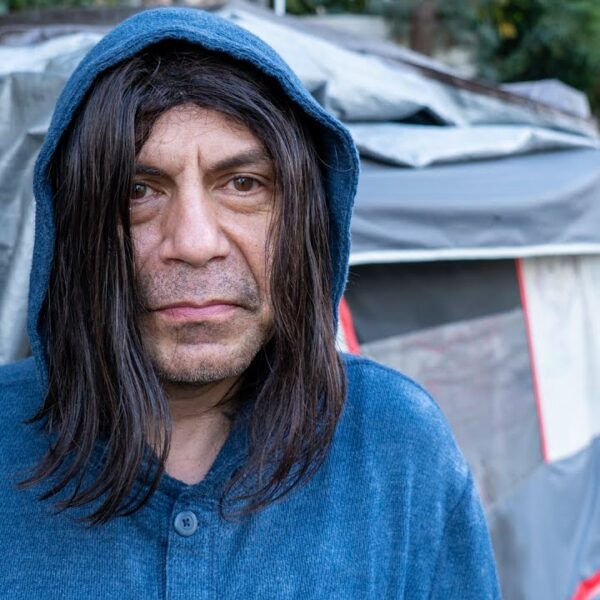Homeless Sweeps on the Rise, Part 2
In part 1 of this in-depth series on sweeps, we covered the definition of homeless encampment sweeps, the rising criminalization, and the financial interests many politicians and influential organizations have in the sanctioned encampment business.
Homelessness has been a crisis in America since the early 1980s. Until recently, politicians have somewhat strived to implement the tried-and-true housing first model. Housing First prioritizes permanent supportive housing over temporary measures such as sanctioned encampments, citations, fines, and imprisonment.
Now, due in large part to a corrupt group of lobbyists representing the Cicero Institute, politicians and even some voters are shifting in the opposite direction. With more public camping ordinances and anti-homeless legislation on the books than ever before, cities and states are being pressured to conduct harm-inducing sweeps of homeless encampments.
We’ve covered how these sweeps are ineffective, costly, and cruel. Today, we’ll discuss how they statistically increase the risk of homeless deaths.
A New Study Suggests Sweeps are Violent and Deadly for Members of the Unsheltered Population Suffering from Drug Addictions
In a tweet about homeless research, Infectious Diseases MD & Director of Social Determinants of Health & Disparities Josh Barocas@jabarocas referred to homeless encampment sweeps as “(costly) state-sponsored violence.”
Our study found that encampment clearance/sweeps could increase deaths among people experiencing homelessness by 25% by 2028. “Sweeping” people is not a solution to #homelessness, but is rather a form of (costly) state-sponsored violence. https://t.co/Pmc9Vzl6wQ
— Josh Barocas, MD (@jabarocas) April 10, 2023
Given the punitive nature of these encounters and the fact that many people evicted from encampments lose life-saving medications, clothing, bedding, and vital supplies in the process, this tweet doesn’t need evidence to back it up. However, beyond the thread is a new study authored by Barocas showing that involuntary displacement caused by sweeps and criminalization could mean 25% more homeless deaths by 2028.
The study, titled “Population-Level Health Effects of Involuntary Displacement of People Experiencing Unsheltered Homelessness Who Inject Drugs in US Cities,” makes use of a closed cohort microsimulation to project estimates of unsheltered homeless deaths related to involuntary displacement. This type of displacement often occurs when law enforcement officials forcefully dismantle tent cities, taking residents’ belongings and leaving them without permanent places to relocate.
The study finds that over a ten-year continual displacement period, unsheltered encampment residents could experience a 25% increase in deaths. Some of the main reasons deaths might occur include:
- Exacerbation of overdoses
- Increased hospitalization
- Decreased access to medications for opioid use disorder
- Serious injection-related infections
* It’s important to note that this study examines only the harms of involuntary displacement of unsheltered people who use intravenous drugs. The study did not include unsheltered individuals who need life-saving medications that are not injected. Examples include cancer patients, people inflicted with multiple sclerosis, heart disease, or Alzheimer’s disease. For this reason, the actual number of potential deaths might be higher. People diagnosed with asthma who lose their inhalers during sweeps are also at an increased risk of death.
Epidemiology assistant professor Dr. Ellie Murray, who expressed support for the study in its content and method of obtaining data, left the following quote on Twitter:
“If you care at all about the health of people in your community, or even if you just care about the costs of providing health care, then you really need to pay attention to this paper.”
Other Studies Expand on the Harms of Sweeps on Houseless Americans
A qualitative research study by Science Direct in 2022 features similar findings regarding adverse health effects from sweeps. To quote the study’s authors, “Abatements harmed unhoused people’s health through four key mechanisms.” The mechanisms listed include:
- Being stripped of access to necessities and life-saving health resources
- Being forcibly relocated to less visible spaces that are often more hazardous, isolated, and remote
- Increased risk for negative interactions between unhoused members of society and law enforcement officials
- General distrust in authority as a result of the above-listed negative interactions. This distrust can create even more barriers between houseless people, social service systems, and resources.
This study calls for further research on the subject matter of sweeps. Available research shows that punitive responses to homelessness pose serious threats to housed and unhoused people. As such, conducting these horrific actions under the guise of public safety is a ruse that must end.
State and City Governments are Quietly Pushing For-Profit Sanctioned Encampments to Work in Conjunction with these Sweeps
Sweeps were costly and cruel enough back when they were being deceivingly pitched to the public as a way of getting homeless people off the streets and into shelters (although this was never really the outcome). Now, people in positions of power are taking the model one step further by pushing for-profit-sanctioned encampments.
Essentially, this means the government could wield power to forcibly relocate unsheltered homeless people into internment camps that churn a profit for billionaires like Joe Lonsdale, who owns and operates the notorious Cicero Institute.
In an exclusive interview with Invisible People, Decriminalization Director for the National Homelessness Law Center Will Knight opened up about the sinister underpinnings of the program and how corporate conglomerates are using compassion to fool voters into thinking they’re doing something kind.
“The sanctioned encampments have the veneer of providing services,” Knight explained. “Most voters are not educated about the realities of forcing people into internment camps, essentially. So, when they vote in favor of criminalization, they think they are doing a positive thing that will eventually eliminate homelessness. That is not the case.”
“The reality is that close to half of all homeless people are employed. You force them into an internment site that has specific hours. How do they get to their job? How do they get to and from there? They can’t.”
“So, this proposed solution of sanctioned encampments literally creates more homelessness and more poverty to force people to go there. It’s a sort of never-before-seen, nouveau criminalization that seems cheaper than jails and prisons, which most people at this point know are incredibly expensive. But it also sounds more cost-effective than the only thing that actually works, which is housing first. You can’t expect people to get over everything that’s in front of them without providing that safe shelter, that structure that eliminates all of the barriers.”
Talk to Your Lawmakers About Seeking Viable Alternatives to Sweeps and Criminalization
Nobody should have to withstand living in a makeshift shelter, be that a roadside tent, a family vehicle, or one of the latest sanctioned encampment options, which are glorified sheds. There are viable alternatives to unsheltered homelessness that are much more effective and much less expensive.
Part three of this series will cover the cities already using these strategies. In the meantime, talk to your local lawmakers about drafting laws that make housing a human right for all.












